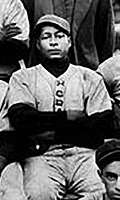Silas Simmons
| Silas Simmons | |||
|---|---|---|---|
 Simmons in 1913 | |||
| Pitcher / Outfielder | |||
|
Born: October 14, 1895 Middletown, Delaware | |||
|
Died: October 29, 2006 (aged 111) St. Petersburg, Florida | |||
| |||
| debut | |||
| 1913, for the Homestead Grays | |||
| Last appearance | |||
| 1929, for the Cuban Stars | |||
| Teams | |||
| |||
Silas Joseph "Si" Simmons (October 14, 1895 – October 29, 2006) was an American semi-professional and professional baseball player for African-American teams in the pre-Negro League era, and became the longest-lived professional baseball player in history. The previous record was held by Red Hoff, who died at age 107 in 1998.
Biography
Simmons was born in Middletown, Delaware. He was a five-foot-ten, left-handed pitcher/outfielder, and began playing for the Germantown Blue Ribbons, a semi-pro team, in 1911. In 1913, the Blue Ribbons became a professional team and were renamed the Homestead Grays, a team that quickly became a Negro League powerhouse.
As late as 1926, Simmons pitched for the New York Lincoln Giants of the Eastern Colored League and appeared in at least one game in 1929 for the New York-based Cuban Stars (East) of the Negro National League. During his career, Simmons played on the same team as Hall of Famer Pop Lloyd and against Hall of Famers Judy Johnson and Biz Mackey. Simmons ended his baseball career soon after 1929.
Simmons was married at Philadelphia by Rev. John L. Lee on September 15, 1915 to Mary L. "Mamie" Smith (July 19, 1896 – ca. 1944). He and his wife Mary had five children and settled into life as a porter. He later became an assistant manager at Rosenbaum's Department Store in Plainfield, New Jersey. After 29 years of marriage Mamie died ca. 1944. In 1957 Simmons married his second wife, Rebecca Jones (1901 – August 20, 1997). In 1971, he retired to St. Petersburg, Florida, where he lived for the rest of his days. After 40 years of marriage, Rebecca died at the age of 96 in 1997. Simmons lived to be at least 108, and outlived all five of his children. At the time of his death Simmons had nine grandchildren, several great-grandchildren, and many great-great grandchildren.
In the fall of 2005, baseball history buff and genealogist David Allen Lambert of the New England Historic Genealogical Society rediscovered Simmons. Lambert alerted fellow baseball historians associated with the Negro Leagues, who proceeded to interview this link to early baseball. In May 2006, Dr. Layton Revel — founder of Texas-based Center for Negro League Baseball Research — met and interviewed Simmons. He also organized the 111th birthday celebration for him, in 2006. It included around 30 former Negro League players from around Florida. A plaque was presented to Silas on his birthday on behalf of the Society for American Baseball Research by Lambert. He was also presented a team jersey with number "111" from the Tampa Bay Devil Rays.
Simmons died 15 days later at the Westminster Suncoast Nursing Home in St. Petersburg.
Age issue
Simmons listed his birthdate as October 14, 1895. This is supported by his World War I draft registration card. Silas was married in Philadelphia, Pennsylvania September 15, 1915; on this record of marriage, he signs his name and gives his birthdate as October 14, 1893. The 1900 census lists Silas as having been born in November 1897, which would make him 108 years old at the time of his death.
However, the ages in the U.S. Census were often incorrectly recorded; a neighbor could easily have given the information if the resident was not home. Silas' mother, Amy, is listed as having been born in 1882, which suggests she gave birth at age 15 (if in 1897) or age 13 (if in 1895). Ages in draft registration cards have also been wrong (for Moses Hardy it lists him as born June 5, 1894). Even if Simmons were only 108 at his death, he still would have been older than Chet Hoff, and thus the longest-lived person to have ever played professional baseball.
Simmons is also the one of two known pro athletes to have been born in the 19th century and died in the 21st century, the other being Karl Swanson (1900-2002).
See also
Notes
External links
- Negro league baseball statistics and player information from Baseball-Reference (Negro leagues)
- Article Silas Simmons' passing as announced by the Society of American Baseball Research
- 1913 Image of Simmons and information about his recent discovery
- Interview and photos from the Orlando Sentinel, October 10, 2006
- Tampa Bay Devil Rays honor Silas Simmons and other Negro League players in 2006
- New York Times article
- San Diego Union Tribune notice
- Indianapolis Star article
- Genealogical Blog article
- Philadelphia article
- Blog "God of Sports" mention of the recent finding of Simmons
- Philadelphia Inquirer story at the Wayback Machine (archived October 21, 2006)
- Silas Simmons and the Fountain of Youth - Thomasville, North Carolina Times at the Wayback Machine (archived April 22, 2007)
- Birthday celebration for Simmons - from the Sun Sentinel, October 10, 2006
- St. Petersburg Times article, October 14, 2006
- Video of Simmons birthday party on October 14, 2006 from Tampa Channel 10 News
- Obituary from the New York Times (incorrectly identifying Carl Boles as the presenter of the SABR plaque: this plaque was presented by David Allen Lambert)
- Obituary from the Orlando Sentinel
- Notice of Silas' death reported with the incorrect birthyear of 1885
- - Biography of Silas Simmons from the Negro League Baseball Players Association website
- Video Interview of Silas Simmons (September 2006) by Alan Schwarz of the New York Times at the Wayback Machine (archived November 12, 2006)